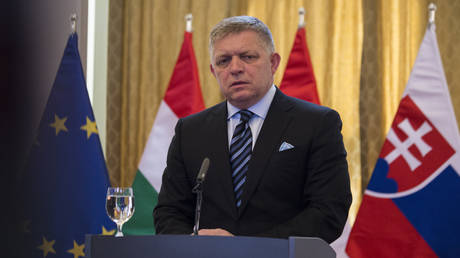
Estonia has rolled out anti-tank obstacles at its border with Russia due to an apparent uptick in illegal migration
Tallinn is prepared to reinforce – or even fully close – its border crossings with Moscow, multiple senior officials have said.
Early on Friday, Estonian authorities brought apparent “dragon teeth”-style anti-tank obstacles to the river bridge crossing in the town of Narva, located immediately across the border from Russia’s town of Ivangorod. The obstacles were delivered by a military truck and unloaded onto the bridge, footage circulating online shows.
Thus far, the concrete pyramids and bundles of concertina wire have not been deployed and remain stashed on the side of the road.
When local Russian-language outlet Rus.Postimees reached out for comment, border guards confirmed the development, describing the apparent anti-tank obstacles as mere “concrete blocs” aimed at stopping migrants.
“We have prepared these concrete blocks in case the Estonian government decides, following the example of our neighbors, to restrict entry into the country from Russia in order to contain the wave of illegal migrants,” the department told the outlet in a statement. Should the closure not happen, the ‘blocs’ are expected to come in handy anyway, since the border crossing is scheduled to get shut down for maintenance starting in February.
On Thursday, the head of the Estonian border guard, Veiko Kommusaar, said the country was exploring the possibility of shutting down its border with Russia entirely. The official also warned against traveling from Estonia to Russia, asserting that “thanks to Russia’s actions, it might become very difficult to return.”
Norway is considering following suit as well, the country’s justice minister, Emilie Mehl, confirmed on Thursday.
Earlier this week, Finland announced the closure of all four border crossings with Russia, citing illegal migration flow as a pretext. Helsinki claimed Moscow deliberately altered its policies to steer migrants from third countries through its territory towards Finland without providing any evidence for such allegations.
The move was condemned by Moscow as a “negative development,” with Foreign Ministry spokeswoman Maria Zakharova warning Finland’s behavior will “inevitably” prompt a retaliatory response.




